#hws meta
Explore tagged Tumblr posts
Note
Favorite modern lore character?

I’ve talked about the VR crew before, but I still think they’re great. Having Tape Girl (Amy), Jeremy, and Vanessa be FNaF true-crime enthusiasts and be constantly misdirected by their good friend Not Michael Afton™ —only to actually end up involved in it all…peak content for me, lol.
#fnaf#williamwasframed!au#alliswell!aftons#tape girl#jeremy vr#vanessa fnaf#vanny fnaf#vr gang fnaf#five nights at freddy's#fnaf hw#art#doodles#meta talks#jeremy was based on matpat before matpat become like…a canon character in the movie#so now jeremy just has a twin brother who works at sparky’s lol#ness has zero interest in fnaf actually it’s just jere#amy’s my fav though
654 notes
·
View notes
Text
this is a really interesting interpretation! I also prefer HRE growing up, (I think he's fully grown by the 1300s or so) but I don't have him as Prussia's father, more like a distant lord since if I remember right, Prussia was never directly part of the empire, only Brandenburg. (I use my friend's Brandenburg OC for this) I think HRE and Brandenburg would be pretty close, and HRE thinks of Prussia as Brandenburg's weird coworker.
ALSO I AGREE, GILBERT IS PRETTY YOUNG. I use my friend's interpretation who also has him born around 1190. He's young compared to France, Spain, even England. I like some interpretations of Prussia where he represents the Old Prussians and adapts/survives the crusades, but I think it's necessary to change a lot from canon. Like he would have to be an adult already in the 12th century, and canon shows him as a kid even in the 13th century. imo nations don't always have "parents" in the way that humans do, they're just little dirt babies. sometimes they have a "parent" type figure, but it's not necessary. Berti just crawled out of a bog one day.
Canon Germania representing a memory of one of the Germanic tribes also makes sense! I've attached him vaguely to the Visigoths in my brain but Cherusci is such a good idea. It fits with the theme of Germanic/Roman clashing, and makes sense that Rome might remember him better than anybody else.
is germania even real. we as a society must discuss this.
51 notes
·
View notes
Text
More random Hyrule Warriors thoughts:
Due to one portion of the game, people tend to focus on pride as the major theme of the game. I strongly disagree with it, because it is literally only featured in one portion of the game. I would argue that instead an accidental theme of the game is CONSENT.
Link has no voice in this game. It is overtly stated that Proxi speaks for him.
There is no choice in being Hero. In this game, when it's discovered that he's the Hero, he's immediately elevated in rank without his say. It's stated that he didn't feel worthy of it, but he would try his best. He is thrust into the spotlight and slammed with the responsibilities of Hero like very few Heroes are.
A major plot point is Cia's obsession with him. His say doesn't matter. His revulsion doesn't matter. She's an ancient sorceress and who knows how long she has been watching Link. I doubt she saw him and decided to attack his era the next day.
Another bit is the emphasis on how the Hero and Princess are destined for each other. Zelda has far more autonomy in the game than Link through her use of the Sheik disguise. It feels like "Of course Cia isn't an option: he's destined for Zelda!" Link's opinion? Who knows.
His soldiers turn traitor on him. They get to choose their side, turning on Link for something which isn't his fault and for something which counts him as a victim in the war. I see it as a popular theme in fanon: Link was the cause of the war. Not Ganon with his chosen actions. Not Cia. Link.
The major choice he made was at the beginning when he chose to run out onto the field and join the battle. Soon after, Proxi found him, made the comment about how quiet he was, and the rest was history.
Almost every Hero got some sort of choice at the beginning of their Hero's Journey. They COULD have turned away. This Link didn't get that choice. He didn't get any choices regarding his role in the war, Cia's obsession, how his soldiers-turned-traitor viewed him. And what everyone remembers about this Link is not that but the moment he gave into his pride. Ow.
417 notes
·
View notes
Text
The worst part too about the Paladin quests is it's Heavensward that's most egregious. It honestly feels like someone had no idea what was going on, or didn't care, or left, and their colleagues left holding the bag with this mess of a story had no idea what to do with it.
ARR Gladiator quests are fine! They're along the lines of the other Class quests, intro you to the job and a complicated character dynamic, and it's a decent time.
The ARR Paladin quests...are just boring. They aren't actually even that bad, they're just...utterly predictable, bog-standard tropes and plot line where you can see everything coming malms away. But they have an internal logic to them that builds on the politics and scheming in Ul'dah. Jenlyns realizes he's an unwitting pawn of the Syndicate, and he was literally chosen for the job cuz he could be easily duped and controlled. He doesn't even get to have imposter syndrome, he's actually unfit for the job (and then strives to do better, leveraging support from Papashan and Mylla to shore up his own weaknesses, which is admirable!).
...Nevermind that traditional Paladins in general are a bad fit for Ul'dah. The heavily armored Sultansworn makes no sense in that desert environment, and looking at a world map we can even see that Southern Thanalan seems to be on the equator. Like it's not even a case of "it's cooler than it seems cuz they're further north." Because they're not. And I know the devs wanted to have Ishgard perhaps be a starter city but that was scrapped due to time and resources, fine but um.
Dragoons are still trained in Coerthas, by Coerthans. Why didn't they just...do that with Paladins? Keep Gladiator in Ul'dah, where it makes sense as presented. But then have to work with Temple Knights to get the Job. Especially since after Ul'dah's intro, the game just forgets the Sultansworn exist and they have no bearing on the MSQ the way the other factions in Ul'dah do. Not even in the finale of ARR's arc where it would make sense. Gladiators are a constant in other side quests and MSQ both.
Stormblood Paladin is also fine--because it goes back to those Gladiators, and we interact with Paladins and Knights across the realm, and deal with those complicated relationships between the Gladiator guild core members. It's internally logical in its drama about finally restoring Aldis's reputation and place in Ul'dah, against the backdrop of the tournament.
Heavensward Paladin straight up makes no sense. Solkzaygl's actions are entirely contradictory to his character and arc from ARR. There's no way for some of the actions to occur without him working with the outlaws in some way. Instead of teaching Constaint, he sends him on a merry chase across Coerthas to learn on his own, and it's only the WoL's aid that sees the boy live, let alone make progress. A random man dies, guilt-ridden, due to Solk's scheming and lies he confided to this poor guy.
And then Highlander-esque "there can be only one" nonsense. Even as a Highlander fangirl in my youth, it was insulting and awful. Papashan, Jenlyns, and Constaint all call out how nonsense, illogical, unlikely, and stupid this whole story is...all to make a sword shine.
Because there's no internal logic to events, let alone the reason for the string of happenstance that leads to the finale.
And we know it's possible; HW Blacksmith gives us a fantastic paladin story! One that fits Ishgard's storyline and HW's themes. HW Dark Knight is also a good paladin story, actually, as they are meant to be another angle on the concept of dedicated knight defenders. Samurai for the Eastern equivalent, and the concepts and tropes present in those quest chains.
But the job actually bearing the name "Paladin" is left in the dirt. As a fan of the concept across various games (video and TTRPGs both), it's quite frustrating how the devs had no idea what to do with this job, despite other members of the writing and scenario team presenting stories that would have fit perfectly well within the framework. Only some of it is misplacing where Paladins originate in the setting; the rest is not taking advantage of the themes and setting of the expansions, and just not caring enough about the characters and story to even try, compared to the rest. Or worse, they did try, and meant for more, but whatever intrigue and complex plot they wanted to create was too much for 5 quests and no guarantee the arc would continue in the future, even if it had landed perfectly.
#final fantasy xiv#Paladin#grumpy old lady hours#lore#speculation#These quests frustrate me so much#even considering other storylines I dislike for their structural issues HW PLD sits at 'worst' for me#meta analysis
247 notes
·
View notes
Note
Do you have any gerame/ameger thoughts you’d like to share? 🎤🎤🎤
It’s a solid rizz ‘em with the ‘tism from both sides. They’re both nerds. Engineers but different flavors. Two archaeologists if you’re like me and so inclined. Special interests galore. You can distract two birds with one Wikipedia rabbit hole stone. Just give them the page for concrete and it’s going to be the most focused you see either of them. They will attempt to engineer their way out of many things, sometimes literally.
Ludwig is also the hood to the falcon that is Alfred; he has the steadfast nature to keep that dreamer from flying away, or merely too high. But falcons are strong, able to bear things much heavier than they into the air. Alfred has that easy personable confidence that can drag Ludwig out of the house and out of the shell. I’d like to think there’s some admiration on both sides. “How does he make interaction look so easy?” vs. “How does that guy manage to stay so focused?” Despite Alfred being older, y’know, it’s Lud that’s got the itinerary for everything while the other tries to get him to be loose and wing it. They can balance each other. It helps that they’re both young yet still and contain a lot of energy.
Also autism be damned but both of my boys can GRILL. Maybe this is just me bringing my own Texas history and heritage into it, but we find that many barbecue techniques here stem from our history of German immigrants and settlement (though of course that’s not the only source). Lud and Al are also just peak dad fashion couple, I fear. Give them both a lawnmower and the white Reeboks, your grass will be cut in no time.
#callsign gremlin checking in#alfred f. jones // daring to fly#ludwig beilschmidt // meine stärken und meine schwächen#gerame // mach speed meta#hetalia#aph america#aph germany#hws america#hws germany#alfred f jones#ludwig beilschmidt#gerame#ameger
185 notes
·
View notes
Text
Studying USUK themes // An analysis of 西米目民's motherland
youtube
I love usuk, and I've found some fan pmvs that dig so deep into what makes me love this ship and nationverse. Please watch the video it is excellent! English translations by Igilis on youtube
Here's my subjective reading
西米目民's Motherland explores three USUK elements: Freedom, Humanity, and Loneliness.


The video opens with two shots of Ame and Eng, trapped.
On the left they're holding their birds (robin and eagle), but they also are those birds in the birdcage (note the chains and the cell between them.) They cannot reach each other and they cannot escape. While Ame's eagle is flying with some resilience, Eng's robin lies on its side, exhausted. England's eyes are hidden, both are cast in shadow. While flowers (a rose?) reaches them both, it's a small relief in their chains.
On the right, they are literally in prison uniforms in prison. England cannot see and America cannot speak - they can't communicate with each other, they are doomed to feel alone. Their prisoner cards have their nation names, suggesting it is them as nations that are locked up.

It's not just them, though. All nations (ltr: Spain?, Port, Rome, China, Russia, France) are trapped. By drawing all of these figures in shadow, the artist reduces their humanity to mere shapes



That's the mindset Eng grows up in, a harsh and lonely world of survival. He turns to violence instead of understanding because that's all he's known

Ame changes this, literally offering a light to Eng. Look at the "freedom" (grass and skies) and innocence (bunny).

England tries to instill his lessons onto America, who grows frustrated both with Eng's rules of the world and his authority. You can see his unhappiness with two of Eng's other colonies. (Is it intentional that the high collars of Can and Ind look like shackles?)
(side note I do think India's a weird choice for this. Australia or NZ would probably have been better)


He still believes in the goodness of the world (flowers, nature, Davie/innocence), but this crumples with the American revolution as he really starts to buck England

He wants to see England as this safe harbor, a home, but that's just not who England is! He's way too jaded.


America starts to become ruthless too. The thanksgiving turkey acknowledges the state's genocide of indigenous people.
He smokes, both a symbol of leaving childhood behind and a blood splatter similar to England coughing up blood re:rev war


"lost my way back to anywhere". Bro's grown up.
At some point, both America and England lost each other. There's such a rift between them, an ability to connect and understand each other
The brightness of the past, of their little home, only exist in blue memory

America continues to be sick of the political nation game

It's WW2 that changes things (WW2, earlier there was churchill and there's a scene with sakuras for japan pearl harbor)
England, the bird in the cage, sees America coming to rescue him. While America has become kind of scary at this point, he so badly wants to save/take England.
Take? Do you see the apple? Garden of Eden, sin?
This apple represents sinful human relationships. Nation-tans aren't supposed to be able to have that kind of connection or their own agency. America, land of the free, Mr. Manifest destiny, wants badly to change that. He wants England, and he might be powerful enough to break all the rules

Again the wall separating Ame and Eng. Some lines flash on the screen:
Eng: What do you want? Ame: Whatever, you never refused Eng: There's something we can never break Ame: I never believed any f**cking rules Eng: Anyway, don't be silly. I can't even imagine how ridiculous what you are planning is. Ame: You know what i mean. Ame: and expect it
While Eng is super resigned, Ame wants to break free. He's bringing light (lamp) to england


They sit a distance away, unable to reach each other. England scoffs off freedom as ridiculous, but America is focused.
They're wearing their nation badges here, they don't have the privilege of being human


But America actually does it! He goes fuck that we ball.
He initiates a real connection, real communication with England despite all the restrictions of nationhood



Their countries are scribbled out, they break free. They are Arthur Kirkland and Alfred F. Jones, they can go past those limits


We get a bit more garden of eden imagery. The snake is here to tempt, but lol America's already bitten that apple and taken the step to "sin".


There's no going back but England meets America, able to love him at last without any rules
USUK can be properly there for each other, they can love each other and find companionship like humans do.

They're free!
TL;DR: My reading of this video is that nations, by their nature, are lonely trapped spirits. USUK has to break these rules to love each other
Would love to hear other people's readings too, cheers
#aph#hetalia#aph america#hws america#aph england#hws england#usuk#hetalia meta#usuk meta#my meta#i really want to analyze their other usuk video#arthur kirkland#alfred f jones
32 notes
·
View notes
Text
Re: Sweden, Norway, and Denmark's Japanese dialects in Hetalia (and potential implications to their characterization) (with briefer notes about Fin and Ice)
Thanks to @nordickies for being the spark that lit the fire to write this post. This information also personally has informed some of my personal takes on the Nordic 5 for over a decade now, so I hope it is useful. A lot of this was more common knowledge back in the livejournal days of the fandom.
Disclaimer: my Japanese is limited and by no means do I claim to fully understand all of the cultural complexities surrounding this topic. I will try, where I can, to back up my claims with at least somewhat credible sources especially since I am someone who is not Japanese in origin either ethnically or culturally, however I DO know more than the average person would because I have lived in Japan, was exposed from my practical birth to the culture and language waaay more than is typical due to me living overseas, and I have studied the language on an elementary level in several academic settings. I am by no means an expert (I am a wildlife biologist by trade), but all of this is done in good faith, and if you do know more than me (especially since I am limited in my ability to get access to academic texts right now — nor am I going far out of my way to find those, as this is a meta post about Hetalia of all things and I am not going to do a whole giant thesis about this for one post), feel free to correct me and/or send me further resources, as I want to convey as accurate of information I can as possible. Part of my motivation for making this post was to spur conversation and hopefully have others who know more than me contribute to the ongoing conversation, to which, I encourage those who read this post to check the notes for any further updates. Another note that I also do not originate from a Nordic country, so there may also be additional layers people from those countries may be able to add. Thanks! Let's begin.
*********************************************************** Like several characters in Hetalia, the Viking Trio speak in unique Japanese dialects that further make them distinct and characterize them in Japanese. Sweden speaks in a Touhoku dialect, Norway in the Tsugaru dialect (which is a specific type of Touhoku dialect), and Denmark speaks in Ibaraki dialect. The Ibaraki dialect is sometimes seen as belonging to the Touhoku dialect group or the Kantou dialect group, and the classification is debated. Generally, Touhoku accents are characterized by slow speech, the slurring of words together, and the muttering of words — as well as being associated with rural country folk (Kumagi 2011, direct PDF download). This dialect is often translated into English as a redneck/hick accent and drawling speech — and as those who speak it are often characterized or stereotyped as unintelligent folks from out in the sticks. Kumagi cites Inoue (1977) as saying that Touhoku dialects are "degraded at the bottom in the Japanese language" scoring low on "intelligence and emotion-related associations." One American English rough equivalent (not localized, but in terms of reputation in U.S. culture) by my best estimations would likely be Appalachian dialects, which are also stereotypically characterized as being a hillbilly, unintelligent, and rural accent also featuring drawled speech and often truncated speech (source). Like many Touhoku dialect speakers in Japan, Appalachian dialect speakers often hide, mask, or reduce their accent, especially if they relocate someplace outside Appalachia, in order to seem more credible to others, as it is generally seen as an “inferior” dialect of American English in the wider culture (personal/family lived experience, but also a good radio piece on it here). The other way Touhoku dialects are translated in media are as Upper Midwest or Northern Plains dialects of American English (not the most credible source, but a lot that is on here that I can confirm to be correct). This characterization is likely a more accurate candidate for the Nordics (and may be why Hima chose this dialect group for them), as many immigrants from Nordic countries settled in the Upper Midwest/Northern Plains (source, personal experience living in this region for a lot of my life). Touhoku dialects are also a more northern dialect group, which geographically coincides with the Nordics being, well, northerners!
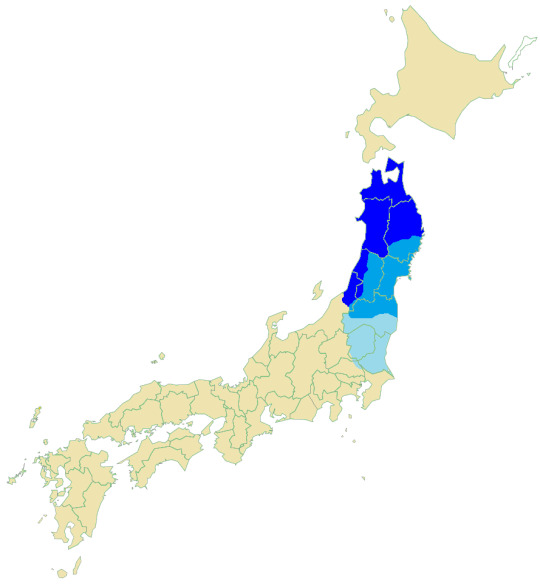
(Map of Touhoku dialects regionally) I have not been able to find any information re: if Sweden speaks any particular type of Touhoku dialect (or if it is more broad), but I will talk a bit about how his speech was transliterated in early scanlations before moving on to the other two. Because of how slurred/more truncated/less intelligible Touhoku accents generally are (and remember, Den/Nor/Ice did not make their appearance until well after Swe/Fin did!), likely early translators decided to chop off letters/make Sweden's speech seem less intelligible in order to convey that to readers. Unlike Norway and Denmark, Sweden also often speaks in shorter sentences/phrases in Japanese, and given that Finland canonically says "it's just hard to communicate with him" (see Running Away with Mr. Sve) that is also likely why early Hetalia scanlators before official translations of the comics were available (note: god this is making me feel old as hell) made the decision to give him the speech patterns that they did, and that ended up spreading through the fandom. When the other Nordics with their regional dialects dropped, given how Sweden’s vocal trait got translated into English and then fandom ran with it to varying degrees of intelligibility, I think the decision was made to not translate Norway the same way to cause less trouble in fanworks, while the Ibaraki dialect did influence how Denmark was translated (more on that below.

Norway speaks in a very particular Touhoku-family dialect within the series that is generally not well-reflected outside of the source material at all. The Tsugaru dialect is spoken in the northwest part of the country, specifically in the western part of Aomori Prefecture — Tsugaru dialect is a particularly unusual dialect, even by Japanese dialect standards, by being one of the most difficult dialects in Japan to understand (source). Even within Japan itself, people speaking this dialect often have to be subtitled on television for other Japanese audiences to understand, and there have been occasions where the dialect has been displayed on television to marvel at how strange and unintelligible it sounds to other Japanese speakers. Sometimes speakers of this dialect have been characterized (or mischaracterized for comedic effect) as French in Japanese because the odd sound and unintelligability of the dialect (source). Kumagi (2011) also states that "[...] within the Tohoku [alternate transliteration of Touhoku] dialects, Aomori [prefecture in which Tsugaru is spoken] dialect is at the bottom [of the hierarchy]," meaning that even among the already disrespected Touhoku dialects, Tsugaru belongs to the worst of the bunch in terms of reputability and respectability in Japanese perceptions. The Tsugaru dialect is a source of fascination, comedy, and disrepute/low standing all at the same time. While we don’t know why Hima selected Norway to have this dialect, I have a few proposals. First, this gives him a similar flavor to the other members of the Viking Trio while keeping him distinct — while Ibaraki is a more southern dialect geographically (for the region), Tsugaru is spoken both more north and more west than it. So if you map their dialects out on a map, their geographical location to each other also somewhat resembles their actual locations as nations to each other in the Nordics! Which is neat!
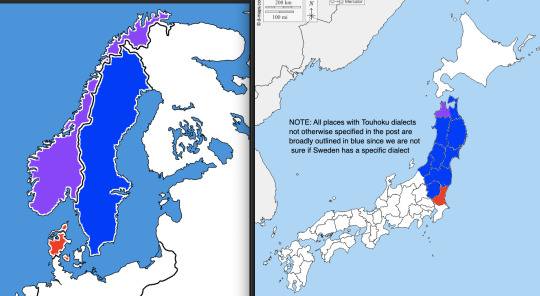
Second, Hima characterizes Norway has being slightly otherworldly and unusual largely due to his fairy-friends and such. But I also think that he likely chose Tsugaru for him not only because that makes him seem like he’s out of this world, but also because Japan is kind of fascinated by that dialect in particular despite not holding it in high regards by it too — sure, it is a hick accent, but it is an interesting hick accent. I think the fact that Japanese speakers sometimes liken the dialect to French is interesting specifically because of how Japanese people often view the French — French culture something that is often romanticized and idealized, and given how Tsugaru dialect can sound French-ish to Japanese speakers, that may be why Norway is kind of designed as the “pretty boy” of the trio by the fandom? In the same way that “Paris Syndrome” is a thing, where Japanese who go to France are often shocked at how their idealized version of France does not live up to the realities of the country (trust me it's real there is a wikipedia page lol), I think you can argue that in-universe Norway can be seen in a lot of different ways depending on the preconceived notions of how you view the dialect. If you view it as French-like and think it sounds interesting, you may find it alluring/beautiful. If you think it is crass, you'll look at it with disdain and disgust. If you think it just sounds silly and stupid, it is. If you think it is nostalgic (as Kumagi states that this is the only positive association this dialect has) and has a close association with nature/pastoral life because of that, it is. I think Norway in canon is characterized on all four of those axioms at the same time (if you really wanna pull canon receipts I will at another time) which makes this make a lot of sense to me as to why that dialect was chosen for him. Third, I think that given Norway was largely the worst off of the three kingdoms for most of history, it makes sense to give him the worst accent in terms of reputation/status out of all of them, too. Note: specifically, re: how Norway uses "brother" in Japanese is also interesting when referring to Denmark. What he is saying is "anko" (あんこ), which literally means "young man/eldest son" directly translated and is specifically only used to mean that in northern Japanese dialects. A good way to put it is it is like people in the U.S. use "bro" as a catch-all term for a similar-aged guy you are trying to get the attention of kind of informally, in the same way you can say "nii-san" to both mean "older brother" and also "guy who seems older than me I am addressing informally" I guess?? Funnily enough, which I didn't know until researching shit, it apparently also means bottom (homosexual) in prison slang??? Which may or may not be intentional I guess on Hima's part, and could also influence your characterization of Norway as a result. Finally we move on to Denmark. The Ibaraki dialect is characterized by number of things, but for our purposes I think that the two most important traits are the general lack of polite speech and the slightly faster rate of speech (unfortunately, my only written sources I can point to are wikipedia and TV tropes again, but I have heard this orally from someone a long time ago - I looked for more credible sources but couldn't find any easily). Because of it being debated as to whether or not is a true Touhoku dialect or if it is actually a Kantou (more southern/eastern) dialect, I think you can also argue that makes sense given Denmark is kind of the "gateway" into the heart of Europe geographically. People have generally translated this as him being excitable and more casual in the way he communicates to other people. I have been able to find less resources on this particular dialect and how it is perceived culturally, so I will sadly have to leave it at that, but from my understanding he is generally translated appropriately in the manga from what I have seen, with the -in' instead of -ing and ya instead of you to have it seem more relaxed/familiar/casual.
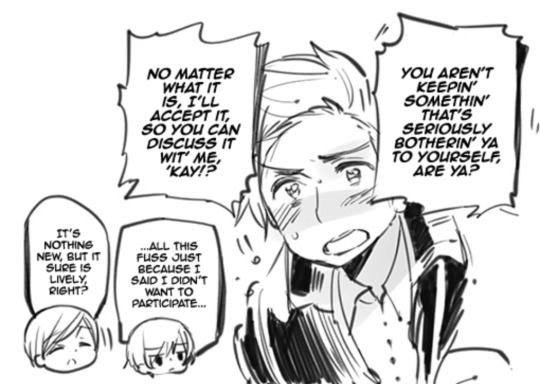
Final notes on Finland and Iceland: I cannot confirm this personally, but from what I can hear from Finland, it sounds like he speaks pretty standard Japanese to me, but take that with a grain of salt since I am not the expert here. Which, dialect-wise, places him as the odd person out (which fits with Finnish being the linguistic outgroup of the five) and also puts him as the relatable “stand in” for Japanese people learning about the Nordics — reminder he is the one who introduces them all in that one comic (see The Nordic 5+a) and even earlier comics (see Running Away with Mr. Sve), and we’re viewing the Nordics from largely his perspective). Since Finland in this series is largely characterized (and often deemed a poor stereotype by Finns) because of the Japanese perspective on Finland/Finns, it makes a lot of sense Hima used him kind of as a self-insert for Japanese readers/viewers to understand the Nordics from, as of the Nordic nations, Japanese folks are likely going to have the strongest familiarity/connection to Finland because of the Moomins. Please take the following information about Iceland with heaping grains of salt, but from a memory, I believe he also speaks the Tsugaru dialect, at least some of the time???? This makes sense he shares the Tsugaru dialect with Norway, as he’s Norway’s in-canon sibling, but I have a vague memory of a meta post I cannot 100% confirm or deny exists re: him only speaking the dialect/the dialect coming out more when he’s alone?? This following is speculation since I cannot confirm/deny that right now with my current abilities, but if it is true, would also be an interesting level to his character and make sense — it puts further distance between him and Norway if he purpsefully doesn’t speak the same way as his brother when his brother is present, and it also is reminiscent of my own experience living with people with discriminated accents who then mask their “less desirable” dialects in their teens/20s so they don’t get discriminated against as they move up in the world. Kumagi (2011) states that "Therefore, young female native speakers of Tohoku [alternate transliteration] dialects feel ashamed of their dialects and hesitate to speak them in big cities such as Tokyo. They are made to feel inferiority complex about their dialects, which are stigmatized as unfeminine". Since Iceland is very much characterized as a teen in canon, I think that this makes sense to do in the broader context of Hima’s choices. The specific reason as to why I state that I believe he speaks Tsugaru some of the time but not always is because there are some panels he speaks without it and some where he does seem to have an accent (HWS Chapter 112, relevant screencap below, this is the only time he speaks like this from what I can find in scanlations/translations, but it has to be a deliberate choice). Would love more info on this from someone who knows more about Japanese than I can do.
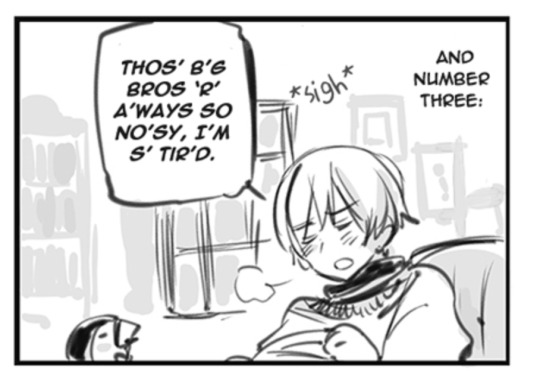
Again, please check the original post and/or notes for any future additions that I will add/edit accordingly (with notes as to where/when that happened) if any other relevant information surfaces, but I hope that was at least a little informative and interesting to read. I consulted a bunch of other resources too (read a bunch of papers I could find online), but a lot of those I read several months ago and no longer can find :x otherwise I would list them here.
Let me know if there are any typos/things are unclear, b/c holy shit this took a lot more effort and time for me to write up than I thought it was going to, and I am too tired to proofread it after spending several days on it. X_X
#hws norway#hws denmark#hws sweden#hws nordics#aph nordics#hws iceland#hws finland#pyrrhocorax meta#just so it is easier to find again :/a#anyway i hope this is interesting at least. idk how this fandom tags stuff anymore
123 notes
·
View notes
Text

I love the cinematography when they first met. The lighting comes from Anne's direction and he starts to be illuminated by it. Challe is chained in darkness, representing his empty opressed existence, until Anne comes, showing that his life will change forever for the better. Furthermore, in the LN it's shown that his hatred for humans slowly dwindles.

In Lafalle's fortress the cinematography is spot on too. Lafalle is in total darkness reflecting his heart and villain story arc. He's actually Challe's shadow, and the representation of his darkness, what he could've become. But on the contrary Challe is illuminated and the light comes from Anne's direction again, showing that she has influenced him positively and inspires him to be better. This foreshadows Challe's hero arc, Lafalle wanted him to join the dark side with him, but Challe refused. They're going to go opposite directions.
#sugar apple fairy tale#challe fen challe#anne halford#lafalle fen lafalle#saft meta#saft mine#stuff I noticed#i could write so much about this so much#The cinematography is spot on#JC staff did their hw
77 notes
·
View notes
Text
One thing I find truly marvelous about America being a Cancer Sun with an Air/Aquarius moon and Russia being an Air/Libra sun with an Cancer moon is that on the surface America is emotionally expressive (smiles when happy, cries when sad) due to the Cancer Sun but often times emotionally cold in an Aquarian moon way (almost like a robot/AI in that feelings must be rationalized or sanitized or outright suppressed) while Russia is stoic on the surface due to the airy Libra sun but feels things with a strong Cancerian moon intensity: nostalgia, melancholia, patriotism etc these feelings run very deep and passionate, like the powerful currents that run beneath the surface of a frozen over river.
Cancer is ruled by the moon, so in a natal chart, a Cancerian moon is right at home and perhaps exhibits Cancerian traits more strongly than a Cancer Sun, at least on an emotional level. Sun is the ego, the vitality, the life force, but the moon is the emotions, the unconscious self, the very depths of your soul. I like to think of it this way: Cancer sun = light side of the moon while Cancer moon = dark side of the moon.
And to be a bit more clear about Cancerian traits, it's essentially this:

So in my mind if Cancer (whether it be a Cancer sun or Cancer moon) is ruled by the Moon, thus making it a lunar entity, America is the light that reflects off the moons surface, that portion of the moon thats touched by the suns purifying light, while Russia reflects the darker shades of the moon, embodies that part of the moon touched by the empty blackness of space, the shadows that sit juxtaposed to the light. They exist to oppose and sharply contrast the other even as they possess the same celestial body, waxing and waning in a never-ending lunar cycle.
#rusame#aph america#hws america#aph russia#hws russia#hetalia meta#hetalia astrology#ivan braginsky#amelia f jones#alfred f jones#i hope this makes sense and I don't sound insane because if you have a basic grasp of astrology this really is beautiful
23 notes
·
View notes
Text
I got so busy working on the Valentines/Palentines fic that I almost forgot it was a Friday!
Here you go!
#a crown amidst courage#linked universe#linkeduniverse#lu legend#lu warriors#Ketto writes#lu impa#hw impa#loz meta#I guess?#I have thoughts#and theories#and lore I made up all by myself lol#there is no canon grounds for zilch that I write#but I have fun#hope y'all do too!
28 notes
·
View notes
Text
we the hetalia fandom mostly used to see the roman empire as kind of a zeus-type figure (always someone's dad, or grandpa, or ex-husband, or dom, or top, or sire of heroes, etc.) but i'm really happy to see that that has changed in recent years. nowadays, mx. china hetalia wang yao himself proudly cheers on + pushes the much more accurate and interesting agenda of his long distance worstie being more like a dionysus:
wilderness + instinct + intoxication + madness + any kind of loving you can handle! ...but not too much, might destroy yourself. know when to quit.
because rome just is an empire—and everyone wants him socratically, platonically, bloodily, aspirationally, carnally, biblically, or any combination thereof.
but china KNOWS a man like that, the emperor type, can't be contained or satisfied by just anyone. paterfamilias needs partners, rivals, concubines, heirs, protectorates, and exiles. china has been through this rodeo before; he's a courtier through and through.
whereas japan, birthplace of hetalia & its author, needed more time to widen/scratch up/change its lens when it comes to nation personification, geopolitics, history, and the internet. himaruya, much like the hetalia fandom + japan + the rest of the internet + rest of the world has MATURED.
there is a REASON that europe was elaborated on first in the canon, but those closer to japan region-wise such as ASEAN had to come much later. there's a reason south korea couldn't be in the anime back in the day. old-timey euro hetalia fans + NA/EU animanga fans in general will never understand the new characters totally because they are rebirths, iterations, reinventions of the core concept.
y'all just try to see more europe, more antiquity, in a japanese guy's multimedia franchise. but the author has grown: can more sensitively perceive and portray the closer neighbors now. whereas, newer fans might find the old material too profane, too far from their regional lens. and they'd be right.
hetalia is a multi-generational and truly international franchise. europeans + those with european heritage FEEL like they know it best because they "found it first," but that's only because himaruya was not yet ready to approach topics closer to his home back then.
so, the longer this goes on, the more "meta" and "genre fiction-aware" the hetalia franchise must get. historihet is just one branch on the tree of this series—one that fragments close neighbors and obscures faraway places.
that is the way the author keeps sanity: no death of the author, no death of the text, no death of the fandom. rebirth. change. adaptation. being passed onto other hands. a legacy.
IN CONCLUSION:
we're fine. some of us are still extremely hurt and have dug their heels in; they need exile + IRL. some are already happy; they pray and stay where they are. others are still trying to find themselves in hetalia—blaspheme or bastardize or make their own; those need time and less scrutiny/pity/critique from NA/EU fans or just hetalia veterans in general.
#aph roman empire#hws roman empire#aph china#hws china#hetalia#axis powers hetalia#hetalia world series#hetalia meta#metaheta#prussiapostingposts#romechu
16 notes
·
View notes
Text
Saw a Criminal Minds gifset and suddenly started thinking about canon vs. fanon JJ.
TL; DR: Fanon JJ is the facade canon JJ puts on to hide trauma.
(This discusses JJ's sister, so content warning for suicide)
The obvious starting point for understanding JJ's characterization is her sister's suicide. That's a traumatic event for anyone, and even more so for an eleven year old child. So it's quite understandable that JJ decides she will do whatever she can to avoid experiencing hurt like that again.
In episode 3.17, JJ tells Will about their relationship, "I didn't want to tell anyone because the minute I do it becomes real, and when it becomes real, people get hurt, and I've always run from getting hurt. Always."
But JJ didn't only lose her sister.
In episode 14.12, JJ's mom admits, "I got so caught up in all my troubles that I forgot there was another little girl under my roof who had just lost her sister. You needed me, and I wasn't there."
At eleven years old, JJ was a traumatized child without a support system. So she learned to rely on herself. Other people were just avenues for hurt, and she decided that wasn't worth it.
All of which leads to this confession from JJ in the season 14 finale: "There are only four people I trust in this world."
My three non-negotiables are Will, Hotch, and Emily. The fourth is between Reid and Garcia, but I lean towards the former given Garcia's penchant for invading people's privacy.
Even if anyone disagrees with that list, there's not a lot of room for choice. At any given time, the BAU usually has seven members, and given the amount of turnover they've had, JJ hasn't learned to trust most of them.
Do they know that? They probably know her facade masks trauma, but I doubt they know the extent of it. There's a reason that episode starts with the team playing poker, and JJ showing Reid he doesn't know her as well as he thinks he does.
So let's talk about that facade. In contrast to Reid, who wears his trauma on his sleeve, JJ buries hers as deeply as she can. She takes care of the people around her, and while it's not disingenuous, it's part of a prettily painted reinforced fortress wall that says, "hey, look at me, such a put-together person that doesn't have problems of my own, so I can help with yours."
And it does the job because it has fandom fooled too.
#criminal minds#jennifer jareau#it's been a while since i've meta-ed#i kinda miss it#tbh meta-ing feels like the hw that should be done before fic-ing#these days i'm too tired/busy to do both so i meta via fic#but that's more based on vibes than coherent thoughts#maybe i'll do leverage: redemption meta next#i go absolutely feral over the way gina bellman plays the sophie & astrid storyline#ahzy meta
56 notes
·
View notes
Text

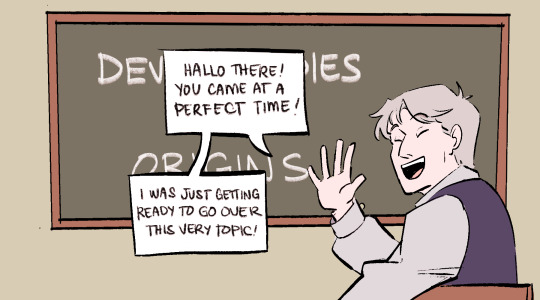

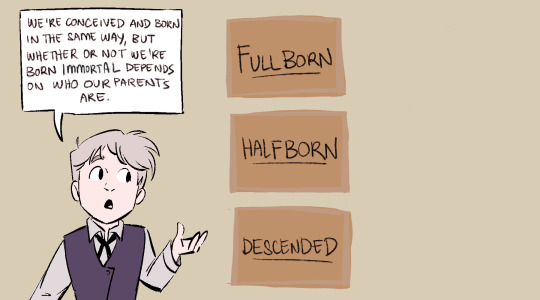
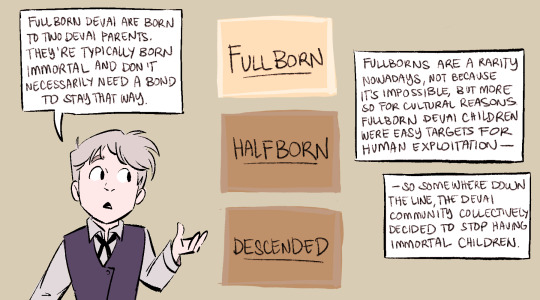
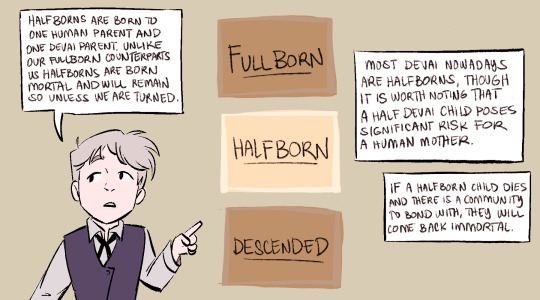

"To summarize, Devai can either be born immortal or they can be turned. Those who are turned require the help of a Mentor to help them adjust to their new life otherwise they become what my people call an Orphan. Speaking from experience, it's something you'd be wise to avoid.
There is... One other way to create a devas, but such a practice is considered taboo among our kind. It's probably best we leave that topic be for now,"
#answered#ask19thcenturydoctorgilbert#[ meta ]#hws prussia#aph prussia#gilbert beilschmidt#hetalia#there is a slight retcon to how fullborn devai exist compared to an earlier post i made#because im gnawing on the idea of immortal devai just existing but free from being bound to humans
70 notes
·
View notes
Text
I feel something of a pity when I see how the fandom ignores Egypt's potential.
Just think: dude was the strongest muslim state for a century. Was a shia caliphate. He fought with the Byzantine E. and western european crusaders for the Holy Land - and won. Was a sunni caliphate and the Guardian of Mecca/Medina, third if you count the center in Syria and the center in Mesopotamia/Iraq. Even after the Ottoman conquest, he was always a “special” province, with his own wars, his own government. Almost conquered the Ottoman Empire itself in the 19th century. The Levant, Libya and Sudan have been his bitches for centuries. After all, only Britain, the strongest empire in history, could conquer him, and he was still on his own. During the Cold War, he headed his own bloc of Arab states against the same bloc of Saudi Arabia. And even despite the failure of socialism, Egypt is the most important state in the Arab world, literally the head of the family.
And the fandom sees this guy as a dreamy pyramid fan? They portray him as small, feminine, raised in Turkey lol what???
Dude was literally a beast of sword fighting, one of the centers of islamic mysticism, as well as orthodoxy and major political players. Yes, he himself taught a lot of people and things.
72 notes
·
View notes
Text


OCtober Day 3: Corinth Physical Notes
I'd have to go back and look for more about Corinth's design in terms of how I arrived at it... I've always kind of pictured her as someone who has the appearance of a mature lady, and someone who looks deceptively soft. She's got a very defensive, rocky personality in spite of it all!
I haven't been colouring these, but her natural hair colour is probably a light brown (similar to Megara's hair colour). She experiments with various dyes to bleach her hair in the sun, I've heard lemon juice, vinegar, or even pigeon droppings were used in greco-roman times, but I'd have to do some more serious research.
#oc tober#aasa corinth#aph oc#hetalia oc#hws oc#hapo art#digital art#clip studio paint#hapo doodles#aasa meta#ancientalia
23 notes
·
View notes
Text

you are nothing without my support | commission for @codesm
#alpha romeo tango#gerame // mach speed meta#hetalia#aph america#aph germany#hws america#hws germany#alfred f jones#ludwig beilschmidt#gerame#ameger
549 notes
·
View notes